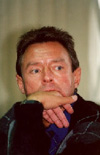 |
|
AUTOBIOGRAPHY
(written in '99) |
|||
|
I was born in Leningrad, in January, 1954. Now, consequently, I am forty-five years old. A bit too much. Especially for someone who wasn't allowed to publish anything over a ten year period. Shout it loudly, but that is true! I started writing seriously when I was about seventeen; my first publication did not appear until I was twenty five and at thirty I had three published stories. The most productive time of my life went by with gag in my mouth. That, however, brings a little bonus: I'm still called a young writer. I published my works in very different places, from Paris to Khabarovsk, and mostly, it was by pure accident. I've published seven books now. Am I young? Not exactly. Experienced? Who knows... In 1976 I graduated from the Oriental Studies Department of Leningrad State University and and started graduate study at the Leningrad branch of the USSR Academy of Sciences Oriental Institute. I've been working there ever since. My area of interest is medieval bureaucracy of China and the laws that regulated it and provided for its stability and efficiency. I have published 40+ scientific papers, for the most part dedicated to a culturological analysis of the Corpus of criminal laws of the Chinese Tang Dynasty, the 'Tang liu shu yi.' The Peterburg Center for Oriental Studies just published the first volume of my Russian translation of this most interesting and celebrated relic. I wrote my Candidate's [Master's] Thesis back in 1980 and at the same time had my first encounters with the secret police. A certain "wellwisher," read "informant," or quite possibly several of them, notified the powers that were about the existence of a manuscript of an anti-Soviet story, "Trust" written by one Vyacheslav Rybakov. Indeed I did write the first version of "Trust" back in my fifth year at the university, in 1976. And, like everything that I wrote at that time, I freely gave it to my friends who expressed interest, and they in turn gave it to their friends and acquaintances who in turn... Well, the KGB summoned me and tried to scare my wits away. It looked like, based on the tips received from the "wellwisher," the guardians of our spiritual order were expecting a somewhat greater enemy of the Soviet system than what I actually appeared. So they seized the story, but let me go. But right up into the Gorbachev years they would call, reminding me who they were and asking a few questions about life, the universe, and everything.... Six years later, using draft copies and my memory, I reconstructed the story and published it. Too little, too late... I tend to think that this episode enriched me. Experiences are experiences; at first, you find yourself close to a heart attack, but then you look at it and out comes a new story. Some of those experiences were used in "No time left." I even named the story's character, a KGB officer, by the initials of the KGB fellow who had 'worked' with me then. But honestly, I really don't need any more of that sort of material. Please. My nervous system isn't as strong as it used to be. In April, 1993, I met a young - oh, that word! - movie director Konstantin Lopushansky. The result of our meeting was a jointly written scenario for the movie "Letters of a Dead Man," which was Lopushanskyj's first full-length feature film. This film essentially secured the government's consent that both of us were allowed to work in arts. It received a plethora of official awards, including the highly prized Russian Federation State Award for 1987. We received it in what's now the White House [Russian Parliament building], right from the hands of Comrade Vorotnikov [a high-ranking government official at the time]. Honestly, the whole procedure was humiliating. But from that moment on, Konstantin was able to make movies, and I was allowed to publish my works. A year and a half ago at Konstantin's request I wrote another screenplay based on one of his ideas. It's not SF. I also made a magazine version for the February '98 issue of "Neva." It's likely Konstantin will use parts of this screenplay in the new movie he is currently making. I cannot help it - I am sensitive. I know it's pointless to have deep feelings, but I do anyway. It's funny: when I lived in a totalitarian superstate, walled off from the outside world by an "iron curtain," my feelings went for the entire humanity. But now that the "curtain" is torn and rotten, and Russia is supposed to join the world's community, I am worrying mostly for my dear country alone. And, of course, for some particular people that I love. Now as always. I think you can see it in my works. Vyacheslav Rybakov 02/11/99 |
|||
| Russian Science Fiction & Fantasy | |||
|
|
|||
|
Send us your comments, proposals, opinions. © Vyacheslav Rybakov © Russian Science Fiction & Fantasy. Editor-in-Chief Dmitriy Vatolin © 1998—2000 Russian version by Miles © 2001 English translation by John Costello 2000 Proofreading by Eugene Zabokritski No part of this publication may be used without the authors' and/or the publishers' permission. |
|
||
|
|
|||
|
No part of this publication may be used without the prior permission of the authors. |